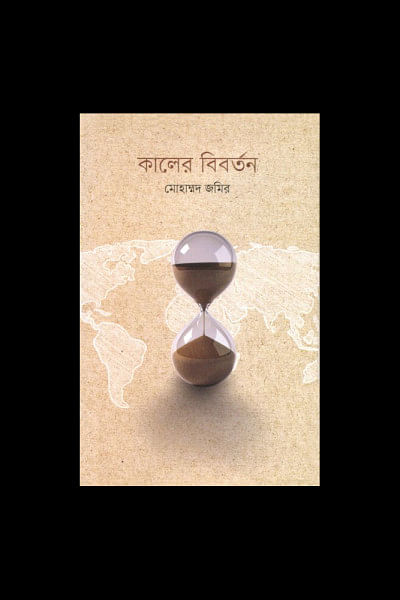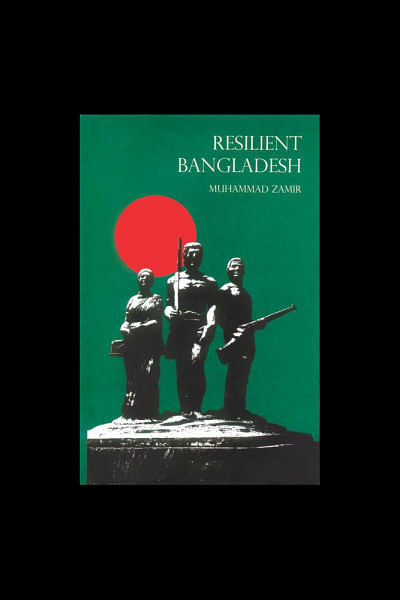For Whom the Bell Tolls

Muhammad Zamir has worn, and continues to wear, different hats. A former career diplomat, he continues to foray occasionally into Track II diplomacy, has studied law, is a perennial fixture on the TV talk show circuit, is a prolific writer in both English and Bangla in the local print media, and is an adjunct faculty in the Media and Communication department of Independent University, Bangladesh (IUB). The two books of his under review, Kaler Biborton and Resilient Bangladesh, consist of articles written in various print media between 2012 and 2015, with the former containing 88 articles, and the latter 89, thereby bringing about a nice symmetry between the two volumes. They expound on a variety of subjects, from Bangabandhu, to politics, to foreign relations, to governance, to cultural issues, to right to information, media and law, to war crimes trial, to education, to economic issues, to water resources, to the RMG sector, to foreign investment, and environment. Now, that is a wide gamut of topics that has been covered.
The difficulty of reviewing such a range of important areas is that, because of the nature of newspaper op-ed and feature articles, they are constrained to be short in length. In this situation, they cannot, and should not, be expected to contain detailed in-depth information and analysis that may be found in well-written academic journal articles and books. And, because Zamir's topics are wide-ranging and disparate, and compiled in two different books, the bells of formidable challenge perforce toll loudly for the reviewer. Fortunately, as a saving grace, many of the articles are found in both the Bangla Kaler Biborton and the English Resilient Bangladesh. Not a few seem to be a translation of one to the other language, while a smattering bears heavy doses of repetition from a previous piece.
Bangabandhu is discussed in three articles of Resilient Bangladesh and one in Kaler Biborton. Besides the panegyrics to the Father of the Nation (and the quibbling on the issue should be brought to a close, if for nothing else than to acknowledge the reality that, before 1971, he was the only political figure in East Pakistan who symbolized in himself the hopes and demands of almost the entire Bengali nation, and had the charisma to galvanize the people around him on the idea of Bangladesh), important issues on the conduct of international relations in a nation-state-based international system are mentioned. Zamir notes how Bangabandhu achieved a signal success in being able to persuade India to withdraw its troops from the territory of Bangladesh, and equally his sagacity in agreeing to participate in the 1970 general elections in Pakistan in spite of the promulgation by Yahya Khan in 1969 of a Legal Framework Order that did not mention anything relating to autonomy or the Six Points. Bangabandhu simply adhered to the Constitution. He was a constitutionalist at heart.
To take up the issue of the reality of international politics. Zamir notes how Bangladesh "was determined to maintain fraternal and good neighborly relations and adhere firmly to the basic tenets of non-alignment, peaceful co-existence, mutual cooperation, non-interference in internal affairs and respect for territorial integrity and sovereignty." Wonderful idealism, but quite removed from reality in the practice of international relations where self-interest of a nation-state is paramount. Non-alignment was a sham in reality, peaceful co-existence is often an uneasy state of being brought about by wariness of each other, mutual cooperation occurs when it suits the self-interests of the parties concerned, while respect for territorial integrity and sovereignty often hinges on the whims of the great powers. If this assessment sounds cynical, then it has to be remembered that cynicism usually underlies the nation-state-based international system (the UN, in matters of great security issues, almost invariably looks towards the permanent Security Council members for salvation).
Zamir recalls the contribution of Simon Dring of the Daily Telegraph (London) and Sidney H. Schanberg of the New York Times in exposing to the outside world what was being unleashed by the Pakistani military on the Bengalis. Their and other reports eventually led to The New Statesman to issue this famous statement: "If blood is the price of people's right to independence, Bangladesh has overpaid." Zamir observes in this context: "This international interest in what was happening in Bangladesh ultimately helped in the achieving of an independent Bangladesh." Several pieces are devoted to international politics. In Kaler Biborton he welcomes the victory of the moderates in Iran, and prognosticates that, in future, the media, while still remaining subject to censorship, will play a crucial role in helping bring about a change in the country's political culture.

Zamir has a perceptive comment on Bangladesh-India relations: "It has been a roller-coaster ride for Bangladesh-India relations…. This has been particularly so in the context of expectations and actual achievement on the ground." The author places much importance on this country's relations with China, now a global economic power, and believes that Bangladesh can learn from that country on how to progress towards becoming a high middle-income country. Zamir is adept in the area of right to information, media, and law. He is seriously interested in the digital world, and notes with satisfaction (likely based on a sense of trepidation) that the 2013 informal meeting between the Presidents of China and the US underscored the increasing importance of the technological superpowers following a regulated and coordinated adjustment in the paradigm of digital growth. "This was stressed because cyber-attacks can lead to devastating effects on economic growth and also national security." In such a complex world, Zamir accepts that a modicum of surveillance is required to protect innocent people from crime and terror. He also advises media persons to realize that freedom to receive information and use such information have to be undertaken in a responsible manner. One would have thought that this basic tenet of journalism would be inculcated in media professionals.
Zamir dwells at length on a thorny issue in the West, and, indeed, in much of humanity: Islamic extremism. While he readily endorses the commonly held view in much of the world, including in Muslim-majority countries, that the misplaced enthusiasm by some perverted individuals "to insult another's religious beliefs unfortunately causes more sorrow and harm than sanctioned by any faith…. governments in the West have to take the initiative to persuade the media not to lump together Islam's cultural and religious aspects with political issues." Zamir believes that the media, which has a mighty hold on the Western psyche, has helped create an environment where many in the West have started confusing Muslim communities there with radical Islam. In the event, "a theft by an Asian Muslim is then no longer just another incident. It becomes a societal and ethnic indictment." The author then goes on to offer this piece of advice: "Muslims also need to help this process of engagement through internal introspection. They have to act and speak responsibly, upholding their values and professionalism in an informed way."
Zamir has written a fair amount on a particular scourge bedeviling Bangladeshi society: corruption. It is widespread, and as an ameliorative device, he brings together the media and good governance. He calls for effective investigative journalism as an essential tool for a corruption-free society and accountable governance. Similarly, the author brings together the use of digital devices and terrorism: "One hopes that we are able to evolve a suitable and effective cyber security mechanism to ensure that terrorists do not gain the upper hand and affect Bangladesh's national security. If that happens, it will not only retard our economic development but will also drag us to the path of being a failed state. Extremism can never be the key to resolution of any problem."
Zamir has a reflective piece on the very antithesis of violent extremism: Sufism and Bangla Folklore. And to think that Islam in Bengal was influenced by Sufism. Part of this article is devoted to Lalon. The author nears the end of Resilient Bangladesh with thoughts on the War Crimes trial. A companion piece has been included in Kaler Biborton. He reasons: "The process undertaken by the Tribunal to address serious crimes from the past must be viewed as being above politics or any particular party's political agenda. It is a purely juridical issue." Both Kaler Biborton and Resilient Bangladesh contain largely interesting, informative, and instructive little pieces. They will not satisfy those who want in-depth, analytical scholarly exposition, but will gratify those who are perfectly content with what they will have just read.
The reviewer is Actor, Professor and Head, Department of Media and Communication, IUB.

 For all latest news, follow The Daily Star's Google News channel.
For all latest news, follow The Daily Star's Google News channel. 



Comments